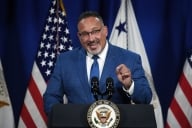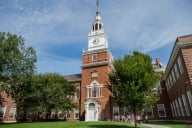You have /5 articles left.
Sign up for a free account or log in.
The president of the Association of Asian Studies last week wrote a column about the controversy surrounding the association’s upcoming conference in India. Hundreds of scholars have signed a letter criticizing the association’s response to an Indian government directive that Pakistani scholars be excluded from the conference, and a second letter has called for a boycott.
The first letter among other things criticizes the conference organizing committee for not informing conference participants “in a timely manner” of the government directive, and for not immediately publishing a statement of support for Pakistani scholars and condemning the attack on academic freedom. "We, the following signatories and scholars of Asia, are deeply disappointed that AAS-in-Asia failed to express a collective ethical and political commitment to academic freedom in Asia by canceling this conference," the letter signed by more than 600 scholars states.
In her column, AAS president Anne Feldhaus said the association chose not to make a public protest at the time the government's directive on Pakistani scholars was received because the host university, Ashoka University, was attempting to get the decision reversed. "Although the AAS officers also found the Ministry of External Affairs’ decision repugnant, we chose (after some discussion) to accede to the judgment of our Ashoka colleagues about the best strategy for dealing with the Indian government, and hence not to raise an outcry then. Even now, as I write, Ashoka is making yet another attempt to get the exclusion of Pakistani participants reversed," wrote Feldhaus, the Distinguished Foundation Professor of Religious Studies at Arizona State University.
Feldhaus said short-term responses to the Indian government’s refusal to grant visas to Pakistani scholars include the continuing attempts to get the decision reversed and "assuring that there is a good setup at the conference site for those scholars who have agreed to present their papers by Skype." Other planned steps include a roundtable session about academic freedom and access at the conference, which is scheduled to take place July 5 to 8 in New Delhi, as well as a “protest booth” for attendees to sign a petition to India’s Ministry of External Affairs. There will also be a special session on the topic at the next AAS annual meeting in Denver.
"In retrospect, I look with wonder at how unproblematically so many of us attended the AAS annual meeting in Washington, D.C., last March," Feldhaus wrote, citing the U.S. government's blanket visa bans affecting scholars from a group of countries. "Just as the turbulence of our times is bringing many people to take an active role in politics for the first time, so I hope that the current debate within the AAS membership will give us a chance to think more deeply about the relationships of scholars with the governments of the countries they visit, work in, lecture and teach in, and try to learn about."








